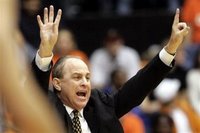Howland-Coached Teams Tend To Jell By 3rd Season
 Long before ending an eight-game homecourt losing streak to Stanford, there was a strong indicator UCLA would challenge for its first Pacific-10 title since 1997.
Long before ending an eight-game homecourt losing streak to Stanford, there was a strong indicator UCLA would challenge for its first Pacific-10 title since 1997. The Bruins' first win at Arizona since 1997 served notice around the league UCLA was a front-runner, but the success of this season was established years ago.
In fact, when Ben Howland was named UCLA's coach April 3, 2003, it meant the Bruins were going to be really good - injuries or not, having seven of the top nine players being freshmen and sophomores or not - come 2005-06.
Howland's track record demanded it.
Howland's reputation as a builder of programs, or a rebuilder in UCLA's case, comes with the delicious appetizer the program will soar in his third season.
Such was the case a decade ago at Northern Arizona, then at Pittsburgh, and now with UCLA, which enters today's game at No. 21 Washington ranked 13th in the nation, and atop the Pac-10. The Bruins are 20-4, 10-2 in the league.
"Usually when you're taking over a program, it's very rare that you're Bruce Weber and you walk into (Illinois) and it's fully loaded, or you're Roy Williams (at North Carolina) and it's fully loaded," Howland said. "Typically, you go in and you're starting over. That's in a general sense."
Howland has no 20-win seasons and is a combined 77-93 in his first two seasons at each school. But from the third year on, Howland is 6 for 6 in delivering 20-win seasons and is 140-38 overall.
"It's everything coming together," UCLA fifth-year senior Cedric Bozeman said. "It takes a little time, but once you step back, you understand it, and it works. It's everything. Players have been in the system for two years, I've been in it for three years, and the guys that now come in just follow the guys ahead of them."
Indeed, some of the credit goes to a better understanding of Howland's defensive schemes, be it straight man-to-man, switching on screens or double-teaming in the low post. And some goes to Howland teaching his point guards the important of a jump-stop, and the beauty of unselfishness in making the extra pass.
But recruiting is the biggest reason, because at each of Howland's stops, the program was in shambles and devoid of talent and depth.
"It's just building a program," Howland said. "Any time you take over a program, usually it's a losing team. So you're building." Daily News
(BruinBasketballReport.com)
(photo credit: AP)


0 Comments:
Post a Comment
<< Back To Bruin Basketball Report Home